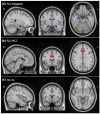The impact of cannabidiol placebo on amygdala-based neural responses to an acute stressor
- PMID: 39400103
- PMCID: PMC11528970
- DOI: 10.1177/02698811241287557
The impact of cannabidiol placebo on amygdala-based neural responses to an acute stressor
Abstract
Background: Cannabidiol (CBD) impacts brain regions implicated in anxiety reactivity and stress reactivity (e.g., amygdala, anterior cingulate cortex (ACC), anterior insula (AI)); however, placebo-controlled studies are mixed regarding CBD's anxiolytic effects. We previously reported that CBD expectancy alone can alter subjective, physiological, and endocrine markers of stress/anxiety; however, it is unclear whether these findings reflect altered brain reactivity. This study evaluated whether CBD expectancy independently alters amygdala resting-state functional connectivity (rsFC) with the ACC and AI following acute stress.
Method: Thirty-eight (20 females) healthy adults were randomly assigned to receive accurate or inaccurate information regarding the CBD content of a CBD-free oil administered during a single experimental session. Following a baseline resting state MRI scan, participants administered their assigned oil sublingually, engaged in a stress task (serial subtraction with negative feedback) inside the scanner, and underwent another resting state MRI scan. Amygdala rsFC with the ACC and AI was measured during each scan, and the subjective state was assessed at six time points. Outcomes were analyzed using ANCOVA.
Results: CBD expectancy (vs CBD-free expectancy) was associated with significantly weaker rsFC between the left amygdala and right ACC (p = 0.042), but did not systematically alter amygdala-AI rsFC (p-values > 0.05). We also replicated our previously reported CBD expectancy effects on subjective stress/anxiety in the scanner context.
Conclusion: CBD placebo effects may be sufficient to alter neural responses relevant to its purported anxiolytic and stress-relieving properties. Future work is needed to replicate these results and determine whether CBD expectancy and pharmacology interact to alter neural anxiety reactivity and stress reactivity.
Keywords: Cannabidiol; amygdala; anterior cingulate cortex; neuroimaging; placebo.
Conflict of interest statement
Declaration of conflicting interestsThe author(s) declared no potential conflicts of interest with respect to the research, authorship, and/or publication of this article.
Figures




References
-
- Allen AP, Kennedy PJ, Cryan JF, et al. (2014) Biological and psychological markers of stress in humans: Focus on the trier social stress test. Neurosci Biobehav Rev 38: 94–124. - PubMed
-
- Baethge C, Assall OP, Baldessarini RJ. (2013) Systematic review of blinding assessment in randomized controlled trials in schizophrenia and affective disorders 2000–2010. Psychother Psychosom 82: 152–160. - PubMed
Publication types
MeSH terms
Substances
LinkOut - more resources
Full Text Sources
Medical

